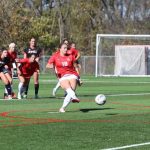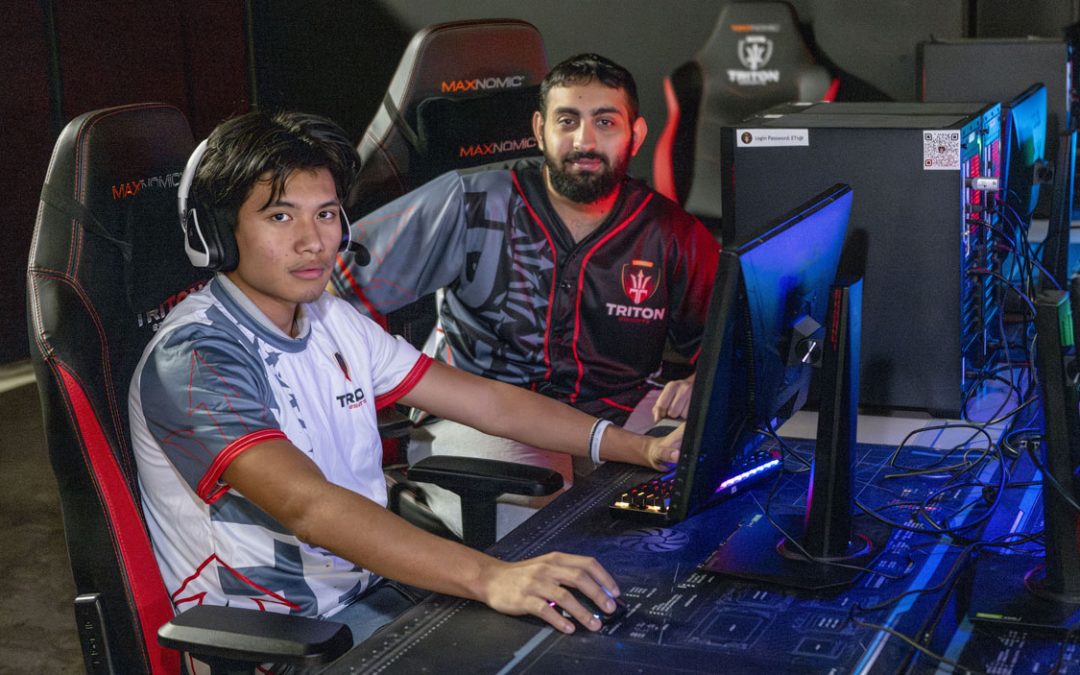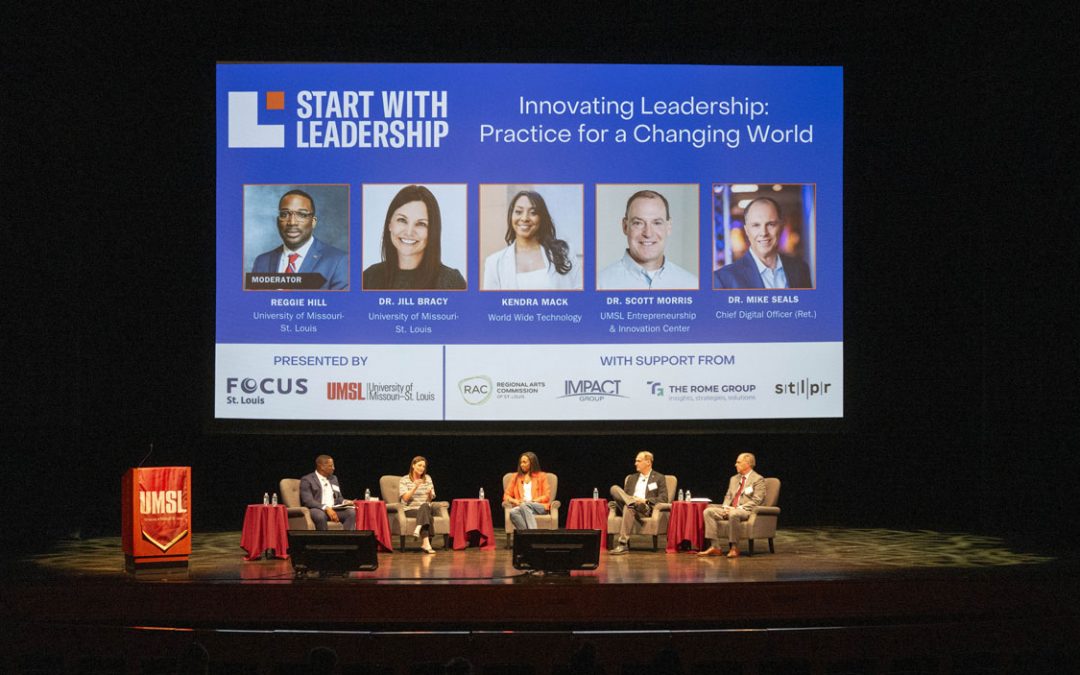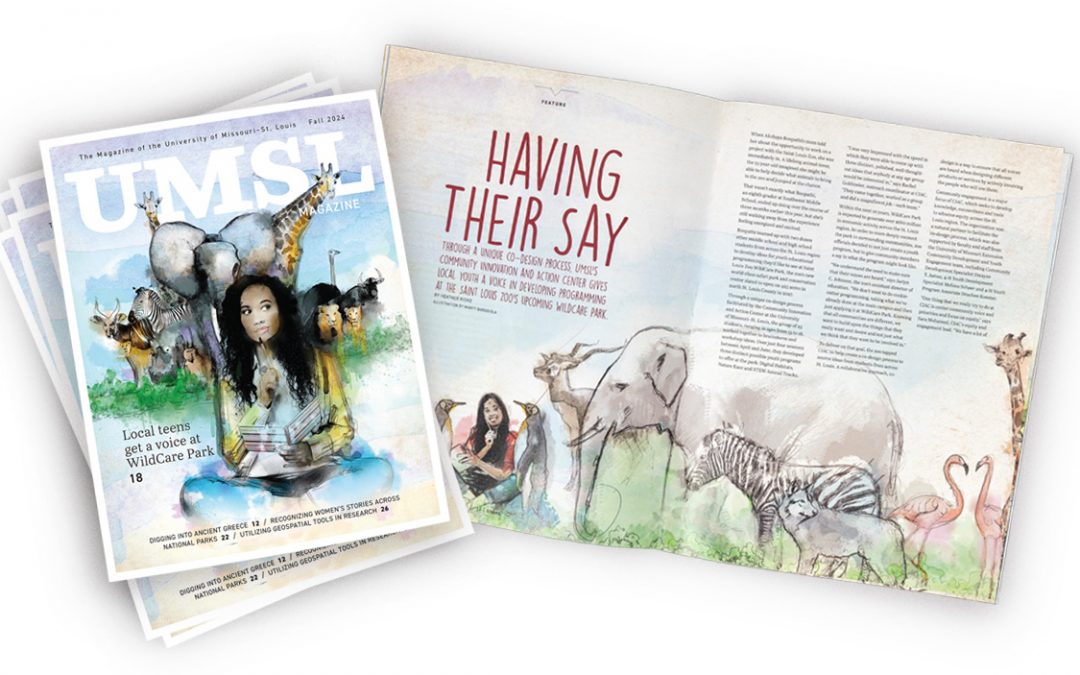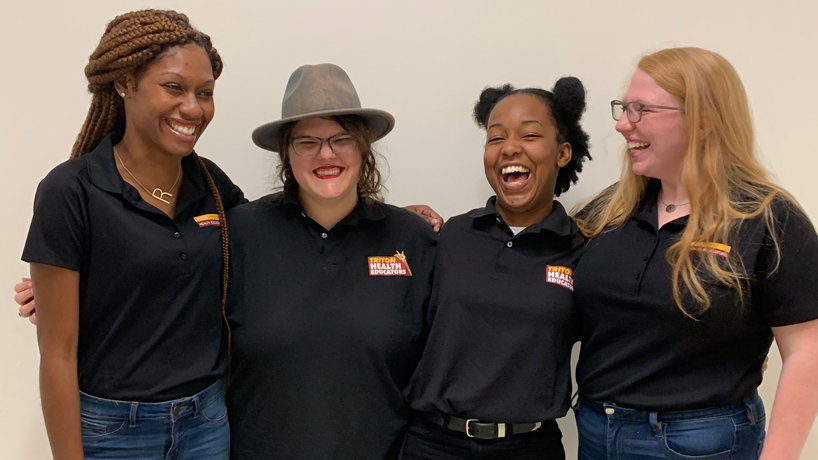
The Triton Health Educators promote health and wellness on the University of Missouri–St. Louis campus. The group (from left) is led by president Raylen Sanders and coordinators Allie Taylor, Cici Miller and Sayde Hindelang. (Photo courtesy of Robin Kimberlin)
It might seem obvious, but Will Ferrell should not be incoming students’ primary window into the college experience. Yet, college comedies like “Old School” still color the impressions of new students each year.
The Triton Health Educators are working to temper those misperceptions and to promote health and wellness on the University of Missouri–St. Louis campus. The peer education group aims to reduce risky behavior in the UMSL community through education and awareness outreach, which is primarily done by staffing booths and tables at events around campus.
Robin Kimberlin, director of UMSL Student Social Services, started the group in 2014. Kimberlin was working with College of Nursing faculty and wanted to start a group of peer educators who would be able to learn public health outreach skills and do alcohol and drug prevention outreach.
The first year, 11 people participated – all nursing students. After that, the group opened to other majors and eventually fell under Kimberlin’s office. Now, the group is comprised of four executive team members, about 10 peer educators and a graduate assistant. Many nursing students remain in the ranks but others are studying subjects such as communication, psychology and social work.
“They do go through a 12-hour certified peer-education training that prepares them for all of it,” said Kaylie Cunningham, a social work graduate student who also serves as the group’s graduate assistant. “Then they continue training once a week.”
Cunningham joined the group as a sophomore and went on to serve on the executive team as president for two years before assuming her current position.
“I’m from a small town and coming here was a huge culture shock for me,” Cunningham said. “I didn’t really know where to get involved on campus. I loved helping people, and it really appealed to me because it was this group of students who not only cared about the people in the group, but they cared about the campus as a whole.”
The group gave Cunningham a support system in a new environment. The experience affected her to such a degree that it altered her career path. Initially, she planned on becoming a police officer, but she realized she had a knack for outreach and decided to pursue social work instead.
Allie Taylor, a psychology student who serves on the executive team as the group’s sex education and healthy relationships programming coordinator, came to UMSL with the idea of becoming a physician. That plan fell by the wayside as she realized she was more interested in psychology and sexual wellness – something she hadn’t expected to encounter on campus.
“I realized that being able to get experience in how to prevent high-risk behaviors, how to help make programming and how to learn to meet people where they’re at was a really cool component that I hadn’t been able to experience in any of my other classes or any of the other things that I was involved in,” Taylor said.
Meeting people where they’re at
There are a number of health issues on campus, but Kimberlin said the Triton Health Educators’ areas of focus are dictated by an annual survey, the Missouri Assessment of College Health Behaviors.
“Based on that data, we can look and see like where our problem areas are on campus,” Kimberlin said. “Are students binge drinking? Are they smoking tobacco? Are they experiencing interpersonal violence? We’re going to look at that data set, and from that data set, we’re going to pull out the things that would be appropriate for peer educators to tackle.”
The results vary each year, but typically the group addresses high-risk drinking, drinking and driving, interpersonal relationships and general wellness. Effective outreach on these topics depends on “meeting people where they’re at” – a positive approach emphasizing understanding of an individual’s situation.
It’s a useful method considering health literacy can be a challenge for students entering college. Kimberlin said students regularly come from high school with perceptions of college developed through pop culture.
“They think that you party and you don’t sleep and everyone’s having sex with everyone,” she said.
Prevention 101
For the group, confronting and realigning those perceptions is “Prevention 101.” Usually, it’s the focus for the first six weeks of the school year. It can be as simple as assuring students not everyone engages in that behavior and providing alternative courses of action.
“Our goal is to hopefully give them the tools so that they don’t engage in any high-risk behaviors at all when they’re drinking or participating in any other college activities,” Cunningham said.
In particular, sleep is an issue affected by these perceptions and tends to fly under the radar compared to more culturally visible issues such as binge drinking and sexual health. Kimberlin said many students feel that they should be pulling all-nighters every week because, if they don’t, it means they don’t care.
“It’s helping them understand you can get sleep, you can study, you can manage your time and you’re still a great student,” Kimberlin said.
That’s not to say that sexual health isn’t an issue. Kimberlin noted that a large portion of UMSL students are from Missouri where sex education isn’t mandated in high schools, meaning many have little formal knowledge of the topic. In those cases, parents, peers and pop culture step in as ersatz sexual educators.
For peer educators, it means starting at a basic level. Taylor said that can mean discussing affirmative consent, the benefits of STI testing or rudimentary anatomy.
“We still have students who won’t even use the words, ‘penis’ and ‘vagina’ for their actual body parts, even though that’s scientifically what the terms are for the body parts,” Cunningham said.
Peer to peer
These can be difficult topics to discuss, particularly with strangers, but most students are fairly receptive. Kimberlin attributes this to the Triton Health Educators’ peer education model, which facilitates a more natural connection.
“We’ve seen that if the students behind the table are comfortable with the conversation, then the students approaching the table are almost immediately in a safe space where they feel comfortable asking questions, and they feel comfortable learning the material,” Cunningham said.
Furthermore, peer educators have greater insight into what students are going through and are visible places staff wouldn’t normally be – the dorm, parties or bars. That gives students the chance to approach peer educators in more casual environments.
Taylor also pointed to the way the group’s events are structured. They usually provide a variety of activities and viewpoints but are opt-in, so no one has to participate if they’re uncomfortable.
Special events
Events are programmed throughout the school year and are designed to let students know they can have fun and be safe.
“My favorite event that we’ve done so far was definitely Sex in the Ballroom,” Taylor said. “I was heavily involved in that last semester, and I’m looking forward to doing it this coming semester.”
It’s a sex-positive event with educational activities that relate to communication, relationships and safety. Around 22 groups and 200 people participated last year, and tables touched on topics from abstinence to sexuality and motherhood – Taylor even had a Pokémon-themed game.
The idea for Sex in the Ballroom came from Meeting of the Minds, a regional conference that brings together students and professionals from different backgrounds to discuss important social and cultural topics.
Cunningham said it’s a good place to find ideas to bring back to campus. The conference was especially helpful in that respect during the outset of the group.
“We took models of what other peer education groups were doing, and that’s how we were able to grow our group to what it is now,” she said.
They have gone from taking ideas to presenting them. Last semester, peer educators gave two talks, one on the roles of a peer educator and another on fraternities and consent. It was Taylor’s first time experiencing anything like it.
“I was kind of getting thrown into this whole world of information that I hadn’t had available to me yet,” she said. “I got tons of really cool ideas. I learned more about sex-positive sex education, and that actually helped me to shape what I want to do with my psych degree.”
Going above and beyond
Mining the conference for ideas is just one of the many ways the Triton Health Educators regularly go above and beyond. Kimberlin said the peer educators are indispensable to her office’s work and UMSL’s alcohol and sexual education and prevention efforts.
“There isn’t an office here like there is at larger universities,” she said. “They’re like the action arm of that part of my job. I do a lot of the reporting and the stuff like that behind the scenes, but they’re the ones out there talking to students, making the programs and doing the education.”
It can be a lot to ask of students who are taking on peer education duties in addition to their regular course loads and jobs. They wouldn’t have it any other way, though.
“These are students who are super passionate and super excited to help the UMSL community,” Cunningham said. “It’s not like they’re required to be there every week.”










